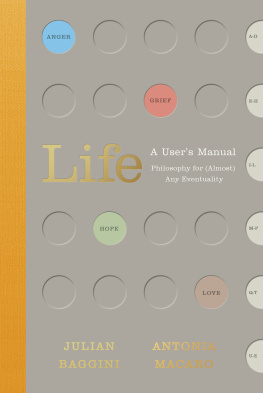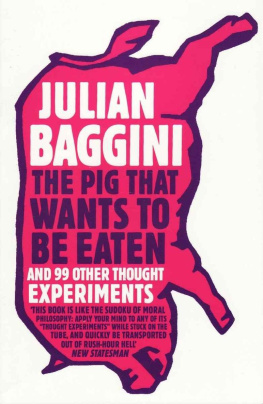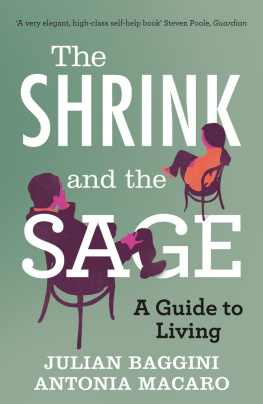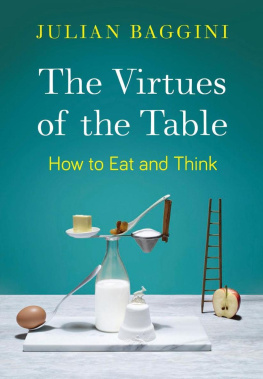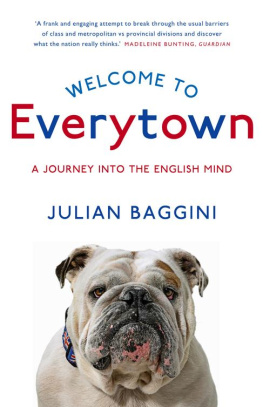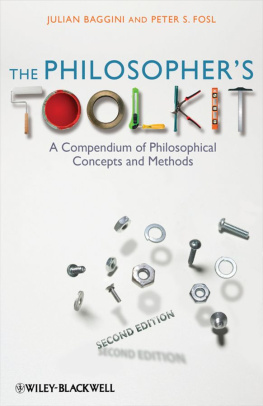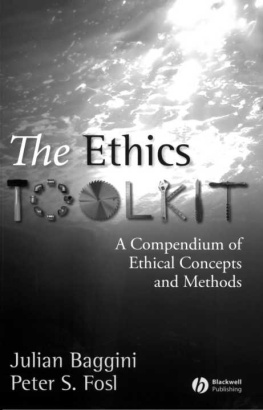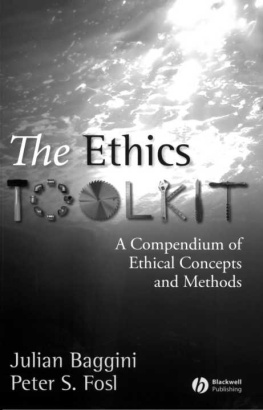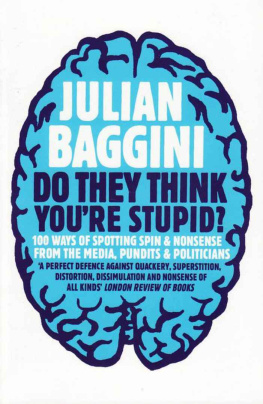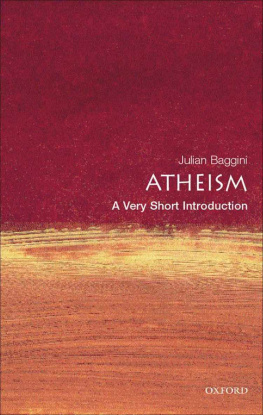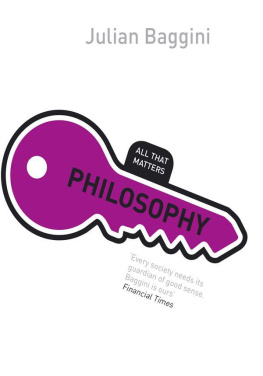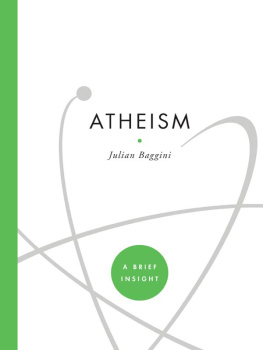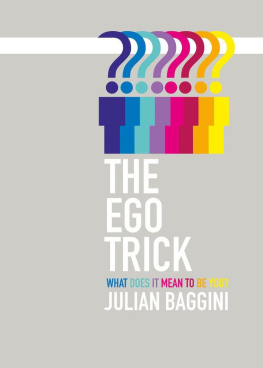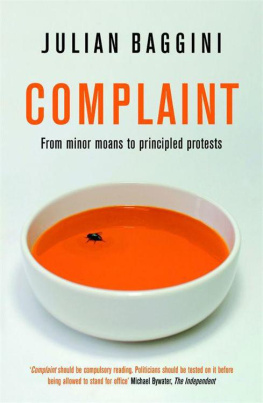Julian Baggini - Life
Here you can read online Julian Baggini - Life full text of the book (entire story) in english for free. Download pdf and epub, get meaning, cover and reviews about this ebook. publisher: Ebury Publishing, genre: Religion. Description of the work, (preface) as well as reviews are available. Best literature library LitArk.com created for fans of good reading and offers a wide selection of genres:
Romance novel
Science fiction
Adventure
Detective
Science
History
Home and family
Prose
Art
Politics
Computer
Non-fiction
Religion
Business
Children
Humor
Choose a favorite category and find really read worthwhile books. Enjoy immersion in the world of imagination, feel the emotions of the characters or learn something new for yourself, make an fascinating discovery.
- Book:Life
- Author:
- Publisher:Ebury Publishing
- Genre:
- Rating:5 / 5
- Favourites:Add to favourites
- Your mark:
- 100
- 1
- 2
- 3
- 4
- 5
Life: summary, description and annotation
We offer to read an annotation, description, summary or preface (depends on what the author of the book "Life" wrote himself). If you haven't found the necessary information about the book — write in the comments, we will try to find it.
Life — read online for free the complete book (whole text) full work
Below is the text of the book, divided by pages. System saving the place of the last page read, allows you to conveniently read the book "Life" online for free, without having to search again every time where you left off. Put a bookmark, and you can go to the page where you finished reading at any time.
Font size:
Interval:
Bookmark:



Julian Bagginis books include A Short History of Truth, How the World Thinks, Freedom Regained, The Ego Trick, Whats It All About?: Philosophy and the Meaning of Life and the best-selling The Pig That Wants To Be Eaten. He has written for numerous newspapers and magazines, as well as for the think tanks The Institute of Public Policy Research, Demos and Counterpoint. He was the co-founder of The Philosophers Magazine.
Antonia Macaro is an existential psychotherapist, author of More than Happiness: Buddhist and Stoic Wisdom for a Sceptical Age, Reason, Virtue and Psychotherapy and co-author of The Shrink and the Sage. She has many years clinical experience in the field of addictive behaviours. Antonia has a degree in Oriental Studies and an MA in Philosophy, and was part of the UKs philosophical counselling movement from its early days.
Also by Julian Baggini and Antonia Macaro
The Shrink and the Sage: A Guide to Living
Also by Julian Baggini
How The World Thinks: A Global History of Philosophy
A Short History of Truth: Consolations for a Post-Truth World
Freedom Regained: The Possibility of Free Will
The Virtues of the Table: How to Eat and Think
The Ego Trick: What Does It Mean to be You?
Should You Judge This Book by Its Cover?: 100 Fresh Takes on Familiar Sayings and Quotations
Complaint: From Minor Moans to Principled Protests
Do They Think Youre Stupid?: 100 Ways of Spotting Spin and Nonsense from the Media, Pundits and Politicians
Welcome to Everytown: A Journey into the English Mind
The Pig That Wants to be Eaten: And 99 Other Thought Experiments
Whats It All About? Philosophy and the Meaning of Life
Making Sense: Philosophy Behind the Headlines
Atheism: A Very Short Introduction
Also by Antonia Macaro
Reason, Virtue and Psychotherapy
More Than Happiness: Buddhist and Stoic Wisdom for a Sceptical Age
Life doesnt come with an instruction manual, so the old saying goes, and with good reason. The makers of phones, chairs, souffls and other created objects have a clear idea of what kinds of things these are, what function they serve and how they should be made or used. And they can draw on all this knowledge to create manuals for users.
Its different for human beings. We were not created with a predetermined purpose. We find ourselves thrown into the world, to use Heideggers evocative expression. Or, as Jean-Paul Sartre put it, for human beings, Existence precedes essence. We are, before we know what exactly we are and how we ought to live. We have to work out our purpose for ourselves: its not a given.
There is, however, one kind of users manual we can resort to, one that requires a small but significant change in punctuation. Strictly speaking, it is a users manual a manual for users written by users. These user-authors are the philosophers who have been grappling with the human condition for millennia, from the ancient worlds of China, India and Greece to the present day.
The words of dead philosophers speak to us across the centuries because human beings have a great deal in common with each other. There are universal human needs and common life situations. Each person, like a snowflake, is unique, just like every situation and every society is different. But we can draw on what we know about humanity more generally to illuminate particular cases.
Of course many believe we are created with a purpose by a designer God who gave us an instruction manual in the form of the sacred texts of their religion. Even they, however, would surely accept that they can learn from other traditions of thought and that the worlds great philosophers have a great deal to offer.
This manual is a compendium of their wisdom. Unlike traditional philosophy reference books, it is not organised by the names of philosophers, schools or abstract concepts but by life situations. When people face problems in life they do not go looking for what the great thinkers have said about deontological duties, a priori principles or the difference between substance and attribute (even though all of these might actually be of use to them) they want to know what philosophers have to say about relationships, work, illness, despair.
The relevance of philosophy to these questions has varied. For the ancient schools, questions of how to live were central. Most modern philosophers, in contrast, have had little or nothing to say about the art of living. However, in the last couple of decades or so, philosophys public image seems to have changed from impenetrable scholasticism to something that could be useful to everyone. Stoicism in particular has grown enormously in popularity, and with its wealth of practical advice on how to live, it is easy to understand why. The Stoics excel in perceptiveness and clarity, and many of their words feature in these pages.
Many who have helped to create this shift have argued that it marks a return to philosophys historic mission and that ancient philosophy was a form of psychotherapy. Supporting evidence includes the fact that both Albert Ellis, founder of rational-emotive behaviour therapy, and Aaron Beck, founder of cognitive behavioural therapy, were influenced by Stoicism. In particular, they acknowledge a debt to Epictetus saying that People are disturbed not by things, but by the views they take of things. The idea is that how we think affects how we feel, so we can change our feelings by changing our thinking.
According to Richard Sorabji, the idea of philosophy as therapy can be traced back to the fifth century BCE , when Democritus said, Medicine cures diseases of the body, wisdom frees the soul from emotions. This view seems to have been retained by the later Stoics, Sceptics and Epicureans. Vain is the word of a philosopher which does not heal any [human] suffering, wrote Epicurus. For just as there is no profit in medicine if it does not expel the diseases of the body, so there is no profit in philosophy either, if it does not expel the suffering of the mind. Stoic philosophers also clearly stated that philosophy should be seen as a medical art for the soul.
But the relationship between philosophy and therapy is not as clear-cut as it might seem. Apart from the point, already made, that some philosophical schools are much more relevant to daily life than others, there is also the issue that meanings can be lost over the eras, as well as in translation. When the ancients spoke of therapy, they did not mean exactly the same as we do. In particular, they did not believe that studying philosophy was a technique for feeling better. They thought that through philosophy we could come to see things more clearly and, most importantly, more truthfully. We would be cured of the false beliefs and values that cause suffering, like attachment to the things of the world. This
Next pageFont size:
Interval:
Bookmark:
Similar books «Life»
Look at similar books to Life. We have selected literature similar in name and meaning in the hope of providing readers with more options to find new, interesting, not yet read works.
Discussion, reviews of the book Life and just readers' own opinions. Leave your comments, write what you think about the work, its meaning or the main characters. Specify what exactly you liked and what you didn't like, and why you think so.

